My Recollection.
MACGYVER MACGYVER MACGYVER MACGYVER MACGYVER
The modern city of Brisbane is awash with the technological marvels of the 21st century: Big W, free-range Aborigines, and internet speeds that would be the envy of 1998. But it wasn’t always this way. My father will occasionally tell of his youth here. A time when Brisbane scarcely rated as a large country town, when the nomad gimps battled on horseback for feed, and the pleasing buzz that emanates from the clock tower was just a faint tickle in the language centres of the brain.
No greater an exclamation point on this declaration of primitivity was there than the toilet situation, which, for a Brisbanoid in the 50s and early 60s, was a shed over a bucket. Do you know how big these buckets were? Not big enough to not just be a bucket. But civilised Brisbane didn’t just expect its fair citizens to grunt sepia-toned shits onto a pile that was once a bucket, so there was the Dunny Man, a fellow cursed by the gods to collect the buckets and take them to another, larger bucket now known as the City of Logan.
This all sounds terrible, as do most tales from the before times, but what boomers lacked in plumbing, electricity, and racial sensitivity, they made up for with a wild disregard for child safety.
It was probably a side-effect of frequently losing children to things like polio, dingos, and dingolio that the general attitude toward child safety was little more than a shrug. Why get attached when they’re just gonna get Hanging Rocked anyway? So sure, let them play with whatever. My dad’s favourite whatever was fireworks.
Fireworks are what the Chinese did with gunpowder because the celestials were so good at killing people the old-fashioned way that the work of effectively weaponizing their alchemical boom-dust seemed pointless. But a giant explosion in the sky is, prior to that, still just a pile of explosives and bucket-shitting Australia thought these toys a fine trade-off for your toilet being a hillock of days old faeces. This included such classic 60s childhood fare as the “Threepenny Bunger”, an item my father described as a quarter of a stick of dynamite that would get willingly handed to an 8 year old in exchange for a pittance of medieval sounding coinage.
Fireworks are the coolest thing in the world when you’re in the 90s and the internet sucks. I may get to go poo-poo like a real boy, but they had explosives. Explosives! They’d just let you have them! I’d sit and listen to dad tell stories about another favourite, the “Double Voice”, which was one firework atop another in a manner that would launch the top one not unlike the professional versions. Or, as dad called it if you found a piece of sealed pipe, a bazooka. A fact a friend of his found out the hard way after being blasted in the head with one.
Unsurprisingly, giving clumps of gunpowder wrapped in toilet tubes to under-tens caused a lot of injuries, so they were eventually banned. At least they were, until a weird quirk in the law made them legal for a few months.
I’m not sure how it happened and thinking about it now makes it sound like the kind of bullshit the sketchy kid in your class would tell you is true. You know, the one who would later get arrested while screaming “SOVEREIGN CITIZEN” at a cop. But I was there when mum, in a staggering display of un-mumness, came home with a selection of actual goddamn fireworks for my brother and I to immediately misuse. This culminated in a learning experience.
We’d built a giant mound of various flammable detritus one finds around a Queensland home and had soaked it in mower fuel. Each of us had our last roman candle, and the idea was to fire it at the giant pile until it ignited. We fired for a while, only to find our safe distance was also outside the effective range of the candles. We sighed and opted to create a kind of Loony Toons style trail of flammable material as my brother, still clutching his candle, walked past the mound.
Here’s the thing about fireworks: they’re imprecise. These aren’t some masterpieces of ballistic engineering, so things like “how many balls are in this candle” and “is that all of them gone?” aren’t on some easily readable LCD display. As my brother walked by our enthusiastically fuelled arsonist’s birthday cake, I heard a stray KSHFWEEEEEE.
Nobody tells you this, because why would they, but the fumes around the petrol-soaked turkey love-pad you’ve bult? Those are flammable too.
It was more a FWUMP than a FWOOSH, but the fireball was about double the size of the pile, and more than enough to wholly engulf my brother. Flaming bits of stick hurtled every which way, I could hear my mother already yelling from inside the house, and I didn’t want to run in case my brother was dead, because then I’d be blamed for everything.
Fortunately, he stumbled out of the blast coughing and singed, but otherwise fine, and we both learned a valuable lesson about the dangers of fireworks and the lack of realism in Mortal Kombat fatalities.
The Episode.
For all I go on about the structural elements of narrative, a lot of it goes on behind the scenes. It’s the ropes, pulleys, and other quaintly physical technology that makes a stage production work, often only noticed when it breaks and drops a Spider-Man to his death. Mysteries are the opposite, they’re Rube Goldberg machines whose value exist only through the visibility of the moving parts. They demand active cognitive attention from their audiences, typically as a form of challenge, and this gives them an objective pass/fail condition alien to other genres.
Did the needlessly brought up then abandoned idea of Homer losing the family’s entire life savings on Lurleen’s career make Colonel Homer an unwatchable piece of shit? Not really, the episode was still funny enough and even a dropped Spider-Man is a fun night at the theatre.
I’ve similarly spent little time on the personalities external to the show. Who wrote what is largely a matter of history or biography, so only highly unusual events like Michael Jackson being able to impose himself into the show have warranted addressing.
Then there’s Black Widower, a fascinating trainwreck of things the audience seldom sees, and I seldom go on about it.
Second things first, you may notice an unusual name in the writing credits, Thomas Chastain, a man who had never written a Simpsons story before and didn’t write another in the two years he lived following this episode. He was a mystery author, famous for a puzzle book called Who Killed the Robins Family? and even served as president of the Mystery Writers of America in 1989.
Black Widower is a bit like Colonel Homer in that if you unfocus your eyes and some of your brain, you can happily watch all 21 minutes of it, but this would be in explicit opposition to what this episode wants you to do. Thomas Chastain was brought on specifically to help with the mystery element of the episode because they wanted it to be a successful mystery and maybe win a mystery award. You can ignore that like you can pretend Lark Vorhees is a talented modernist poet, but you can also wear a sandwich on your head, doesn’t make it a hat.
The problems begin from the ground up, this should not have been the second Sideshow Bob episode. The ending of Krusty gets Busted didn’t really set up for this as Bob wasn’t threatening revenge or consumed with anger as he was taken away, leaving this episode with the work of having to establish that Bob was consumed with rage and wanted revenge, only to then immediately undo it as the plot needed him trusted by the rest of the family. Cape Feare was about Bob’s rage and about him as a legitimate mortal threat to Bart, it didn’t need to backpedal anything. Shifting these around would mean Black Widower wouldn’t have to waste its first eight minutes on a clumsy block of exposition and a montage just to establish the board the mystery is going to play out on. Though, given the quality of the mystery, eight extra minutes mightn’t have helped.
When Bart got Bob to crack under the pressure of absolutely nothing in Krusty gets Busted, it was bad, but bad within the first season of a 1989 animated sitcom. Black Widower hired the PRESIDENT OF MYSTERIES for this episode which boggles the mind as the mystery is somehow worse.
The core of a mystery is an explicit question, definably different from the passive “what will happen next” questions inherent to narrative. Now, while the question must be explicit within the narrative, the means by which it is presented doesn’t need to be. This is the difference between a murder mystery that overtly poses a question, like whodunnit, and something like Black Mirror, whose questions are more ambiguous twists. Black Widower is the former, so the latter won’t be much further discussed. I bring it up only as a matter of taxonomy.
This explicit question is often a “who”, but needn’t be, and narratives can leverage things like “hows” and “whys” into excellent storytelling tools. Memento shows us who did what, leaving the question to be answered a why, creating both a connection to Leonard’s condition and a sense of tragic inevitability. Regardless of the question, though, a mystery has one major challenge: information management.
For a mystery to be a mystery, its explicit question must be answerable (in the case of twists, it must fit with all the presented information). The puzzle it creates must be solvable by the audience with the information presented within the work, so creators have to balance giving away enough to accomplish this without giving away so much as to spoil it, and there is a surprising amount of complexity involved in this.
A work of literature will have a writer, and that work will have a reader, but that’s not all. A writer is a real person, but they also exist within their work as an abstraction, a reflection of all the narrative’s features. Then there is the narrator or narrative voice, the emergent property of separate self that comes from the actual prose you read. And while a reader exists, the writer can’t know who that is, and so must conceive of an imagined reader, an unreal conceptual being to whom is targeted all the writer’s clever literary tricks.
There are differences across media types, word choice swapped out for cinematography, for instance, and certainly fun debates around the nature of authorship in collaborative media, but the construction of a mystery is always going to involve the above ideas.
So, a real author must use a narrator to create a narrative world that presents information to a character in a way that allows an imagined audience to solve a puzzle while maintaining narrative cohesion. Meanwhile, the audience will be thinking about, not just the narrative, but the superstructures around it, such as the narrative voice or abstract author, to aid in solving the riddle.
Black Widower creates its mystery by separating the audience’s knowledge from Bart’s at a critical juncture. We see the clues at the same time as he does, but we are then given an omniscient look at Bob’s actual plan, and it seemingly being pulled off. A standard implied question of the story format and genre results from the audience knowing that Bob can’t win and that Selma isn’t dead, but the explicit and overtly asked question occurs when Bart is revealed in the chair and tells Bob/the audience how he figured it out.
The imagined audience for this episode has to be incredibly dumb as a challenging mystery would have been wildly inappropriate, this already makes Chastain’s hiring a bizarre choice, but one made stranger still by the fact that the mystery doesn’t work at all.
The show presents the audience and the detective with motive and opportunity in the forms of Selma’s wealth from an investment in Mace, her inability to taste or smell, her post-MacGyver cigarette, and Bob’s reaction to the lack of fireplace. Each of these is signalled as significant by having Bart conspicuously observe each moment. This would be fine, but most of these moments are also when Bob, the supposed plan-haver, is getting this information as well.
While Bob is referred to as Selma’s “new” boyfriend at the start of the episode, the relationship is shown to have been developing for quite some time across a variety of montages and events. All of which would be a cunning plan to get Selma’s money, IF HE FUCKING KNEW SHE HAD ANY. Bob asks Selma how she can afford the wedding, and Selma implies she already told him (an earlier letter mentions a lucrative nuisance lawsuit hobby, but that’s never brought up again). Neat, so, WHY THE FUCK DID HE ASK? There are two options here: Bob forgot and he wasn’t planning anything, or he remembered and asked for no reason. Bob’s pivot to devious murderer who was never attracted to Selma makes no earthly sense as a twist because it clashes with, rather than recontextualises, prior information. Was he marrying her on the off chance an aging DMV worker just happened to be sitting on a nest egg?
This one basic detail fucks the mystery entirely, and when you hired, again, THE PRESIDENT OF MYSTERIES to help write your episode then your mystery-fucking mistake also destroys the story. This is the machinery on display, everyone came to marvel at your Rube Goldberg, so it had better actually bloody work. Even the motive is abysmally presented. The opening act deals more with Bob as a potential child killer rather than thief, his financial situation is mentioned only once and in passing.
These are such a bafflingly simple details to have fixed, too. The clues could have come up as discussed content of the love letters, presenting it as new information to Bart and the audience but known to Bob before he even got out, and he could have tied a need for money to a desire to start his own children’s program, which would both connect it to Krusty gets Busted and be a far better motive than the hot nothing we got.
The matters discussed here are common across all, but mysteries make bare the matters typically hidden. The analogue space of a less than convincing actor or a shot style that moves about too much is replaced by a digital machine that must work because it is sole point of the genre. Black Widower is not just a sloppy episode with dumb narrative decisions or gaps, it presents itself as a mystery and hired a mystery writer to affect this. It demands you look at the machine because that is where the payoff is.
Black Widower doesn’t fail because it buries its clues absurdly deep. It doesn’t fail because it expects far too much of an early 90s sitcom audience. It aims low, it brings in an obvious villain character into a show whose format precludes things like exploded Selmas, and it hires CAPTAIN MYSTERY to help out. Write these elements down onto some coloured blocks and a chimp could arrange them in a logical manner. It is a machine so simple that anyone could fix it, so when Black Widower fails, it fails in such a staggering manner that it is almost an achievement.
Yours in not wanting the chapstick anymore, Gabriel.
Jokes, Lines, and Stray Thoughts.
First things first, “Maybe Bob knew somehow—” no, shut up. Hypotheticals are terrible in a standard narrative and goddamn antithetical to mysteries. At no point are you allowed to defend or decry a story with something you pulled out of your arse. Narratives are closed spaces; the material tells you how to understand it.
A good mystery is like a good twist in that it supports and enhances an otherwise well-made work. If it’s the only thing about a work, then it’s a shit work, regardless of the quality of the puzzle. In this, it does not pay to try to outthink every possible audience member. You can’t, no amount of clever is going to beat an internet full of lonely spectrum-dwellers trying to break your thing. Trying will leave you either coming up with nonsense solutions like Johnathan Creek or simply denying the necessary information to your audience like Primer. The narrative is god, you control the information, so burying solutions isn’t impressive. It’s the difference between a magic trick pulled off using skill and one pulled off using video editing.
Mysteries always look more complex than they are to the audiences watching them. Even the presentations are fairly simple when you deconstruct them and familiarity with the structures the mysteries are poured into makes them even easier to solve. I got into an argument with a girlfriend after picking the twists in 3 Black Mirror episodes in a row because she refused to believe I didn’t look up the John Hamm special twist online beforehand. It’s really just a matter of familiarity with narrative and genre, though. Knowing that there’s a twist at all is already more information than I should have. I pieced together the main twist in Mad Men this way but would probably never have suspected anything had I not been told there was something to suspect. In this, there is a similar rule for audiences: you can break narratives easily so there’s little value in trying. A big part of why I loved Hereditary so much was because I went in with absolutely no clue about it and so was able to experience it without the clutter of predictions. The most you’ll ever do is look clever to someone, but it really isn’t worth it.
Hey, look a Dinosaurs reference and jab. It ran for 4 seasons and was actually pretty popular at first, but it also cost a lot to make so it was cancelled. Like The Simpsons it mixed depth with comedy, but went more for topicality over character and sitcom standard humour over complex absurdity. It’s not without its charms, but each element was so starkly separate from the other that they never got the mix quite right, leaving both elements feeling like separate slides on a powerpoint presentation. That said, the final episode is a family of puppet dinosaurs dealing with an apocalypse they created was quite good and is still remarkably harsh.
Homer delighting in watching Baby Sinclair beating the father, while sitting with the child that did the same to him, is funny. Feels highlighted enough to make it a joke, but I doubt it is.
Nice run of dreams again. Lisa’s Elephant Man reference is nice, Homer’s is amusingly sci-fi, and Bart’s finale is a great topper. It counters the fundamental ridiculousness of a long dead man with a birth defect and a scientific impossibility with something that is absolutely feasible but impossible only thought contexts. The smile on the dream Homer’s face is amusingly static.
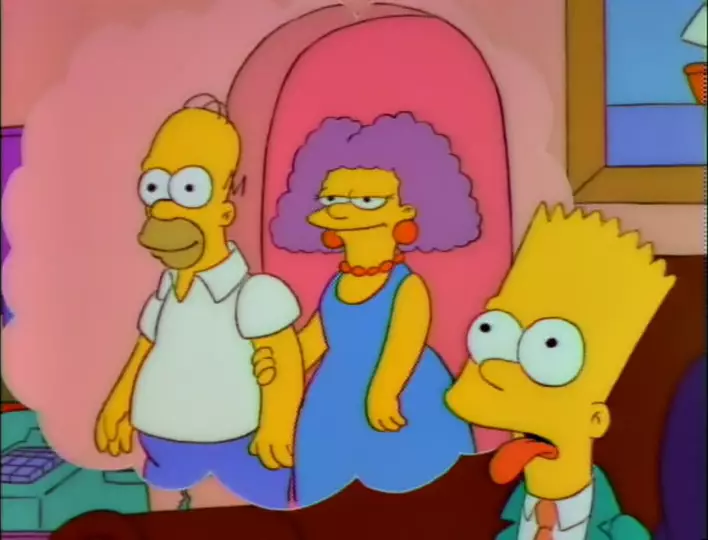
Bart and Lisa’s reaction to Bob here is largely out of order. His only current crime was framing Krusty to take over his show, and while one can argue that revenge or a desire to cover up a crime is motive for murder, child murder requires a bit more work. He has not been established as that here, and Bob wasn’t even angry at Bart in the conclusion to Krusty gets Busted. It was always going to take a narrative moment to establish Bob as being consumed by rage but putting Cape Feare here would mean that said rage could be the whole episode. Here, they have to waste time.
The fade to the dinner scene is sloppy work. It spares us a pile of largely pointless action but tries to maintain the conversation across most of a dinner. The little musical cue is an attempt at a cover.
The fact that Bart and Bob are sitting together is funny, but only because it’s pretty stupid.
Homer miming gutting a child in front of Bart is funny, leverages off of his established lack of awareness, and plays into further versions of this in Cape Feare.
Homer’s “I am not” reaction to being told he is ignoring the first two noble truths of the Buddha is good.
Hey, Cool Hand Luke references. Like a lot of Simpsons intertextuality, watching this film will fill in the blanks of a loooooot of stuff. It’s also a very good movie.
The list of sidekicks is novel and is the kind of thing that would be populated by more regular characters like Bumblebee Man today.
Pepito! The Biggest Cat in the Whole Wide World!
The fight slowly draining out of Bob after the injection is a lovely touch.
“Just don’t drop that thing in the shower, Bob” This is an interesting joke construct as it’s a reference to violent gay prison rape but has somehow become the acceptable means to do one.
There are prisons this crowded, and the pictures are fucking ghastly.
“Who used my chapstick?” is a great joke with great delivery following the remark about becoming animals. It’s asked so pleasantly.
I wonder if I could get a DIE BART license plate.
Bob threatening to murder Bart highlights the oddity of this whole situation. Like, Marge will not use the good silverware but is okay having a potentially dangerous man with a motive to hurt her son sitting right next to her. The show should have, and does in later episodes, use Bob’s natural charm as a means of explaining how he gets away with things, and exploring the idea of people’s susceptibility to the silver tongued.
Snake in the cell as Bob’s having his Emmy taken away.
The trunk of awards is a good joke.
Kismet, meaning fate, is an English corruption of an Arabic word via Turkey, “qisma” that originally meant division, portion, or lot through which it picked up its relationship to fate’s doling out of said.
All of what Bob is going through here is genuine.
The chapstick pass in the foreground is a great callback. Framing is more than the physical, so you can hide things in the foreground when the focal action is further back. It helps that the crowded cell creates an expectation of foreground bodies, as well.
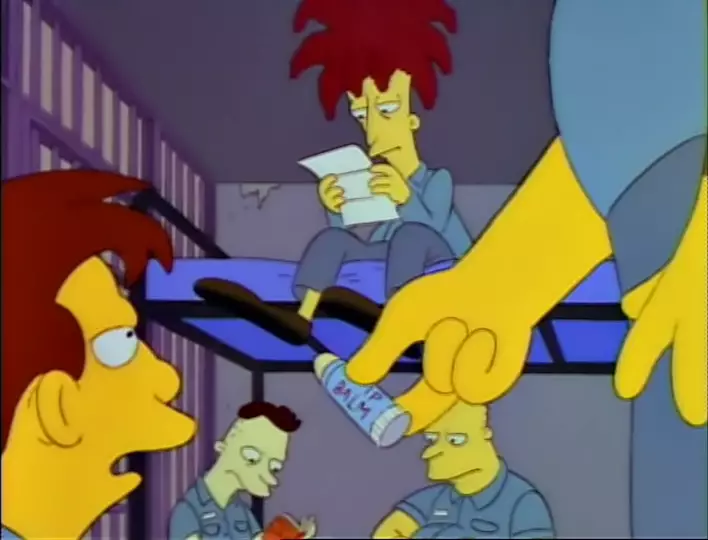
“Lucrative hobby filing nuisance lawsuits” could have been made to factor into Bob’s knowledge and therefore the actual nefarious intent in his getting together with Selma. It doesn’t, because the people who wrote this episode are chuds. Even then, what did he want the money for? There can’t be so much that the goal could follow the acquisition. If you murder someone for millions it’s because millions can do a lot of things, but Selma is still Selma who lives with her sister and doesn’t demonstrate any signs of that kind of wealth. So a savings account of, what, maybe tens of thousands? Not enough for any of Bob's established goals or reasons.
“I forget which one I am” I wonder if that ever actually happens to twins. That said, Selma’s M hair means she’s the one at the back.
So we’ve gone from having to waste time establishing that Bob had and now doesn’t have a murderous rage toward Bart to wasting time establishing his affection for Selma. The way this montage is done suggests a large span of time. Montages with fades and a lot of different time signatures will do that, this is why they’re used to show long, boring processes like training for something. This really emphasises the problem of Bob’s villainous turn, because he was doing all this for what feels like months and for no other possible reason than the one presented.
The sound of rubber stretching during Selma’s Big Cheek scene adds to it nicely.
I like that Selma, desperate as she is, maintains her personal boundaries with things like the cheek kiss. Good for her. It’s hard to maintain your self-respect when you’re lonely. So…very…hard.
When I talk about objective fuckups existing within a work, I am talking about exactly this shit. A whole first act spent on showing Bob becoming a good person, which a good reveal would recontextualise as a reflection of his sociopathy which enhances his villainous character and shocks the audience. All you have to do IS HAVE THE FUCKING ORDER OF INFORMATION CORRECT. Or your reveal is a plot hole. This is an objective error.
Parody of Norman Rockwell’s thanksgiving painting “Freedom from Want”, of which there are myriad other parodies. I feel like this one needed the extreme foreground guy, who’s grinning eyeballs peeking above the frame always amuse me.
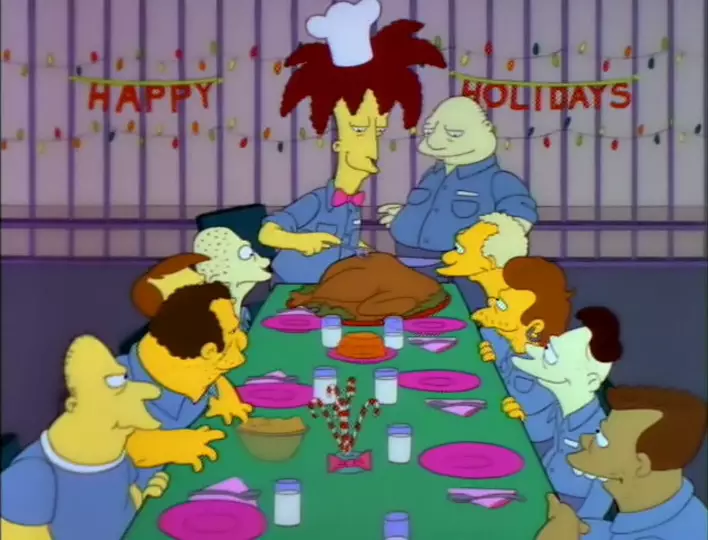
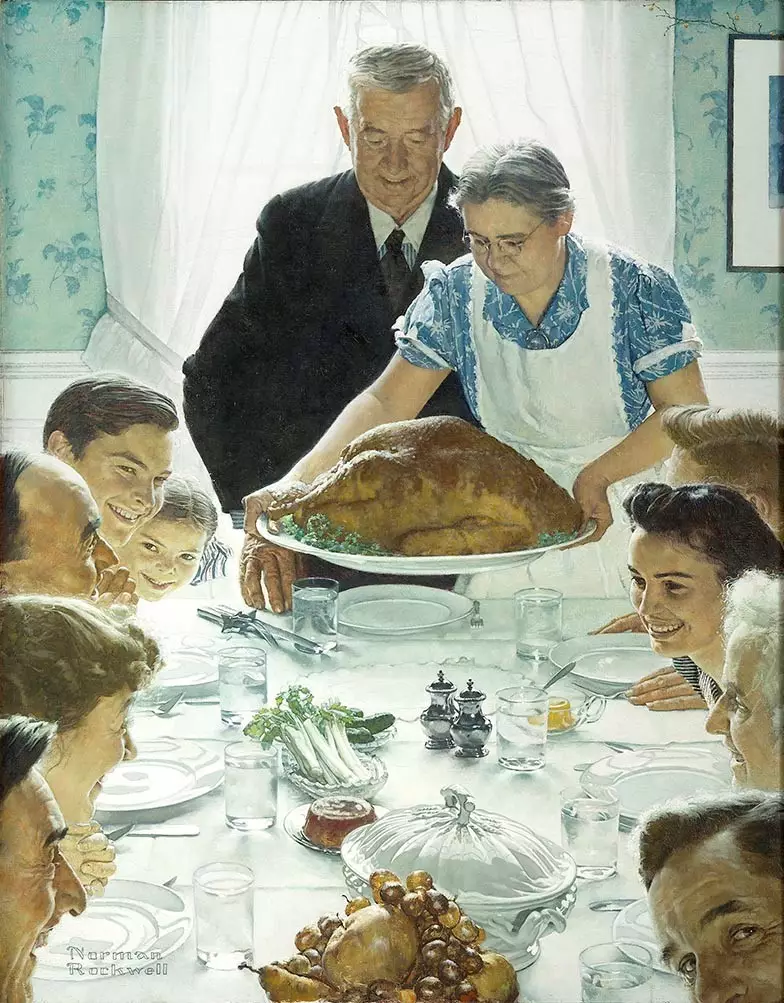
Bob’s inmate number is Jean Valjean’s from Les Miserable. It comes up many more times across the series and is a reference I’d like to see retired because it’s fucking always used.
Conjugal visitation is oddly progressive for prison systems, most local ones don’t allow it, though they started in the States as a means of motivating negro labour.
Selma resembling the Moai in her tourist photo is such a good little joke, the kind you actually have to be quick for as it lasts only a second.
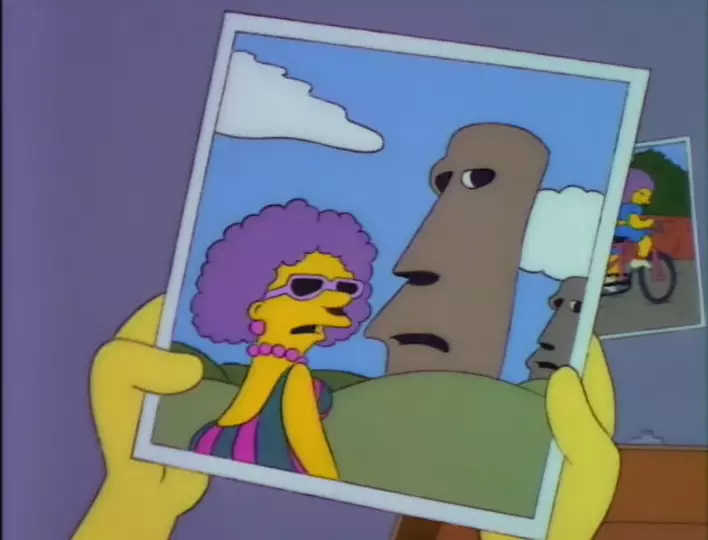
A Wizard of Oz farewell reference and Snake gets his name. Looking at his tattoo now and man, it’s a crude job.
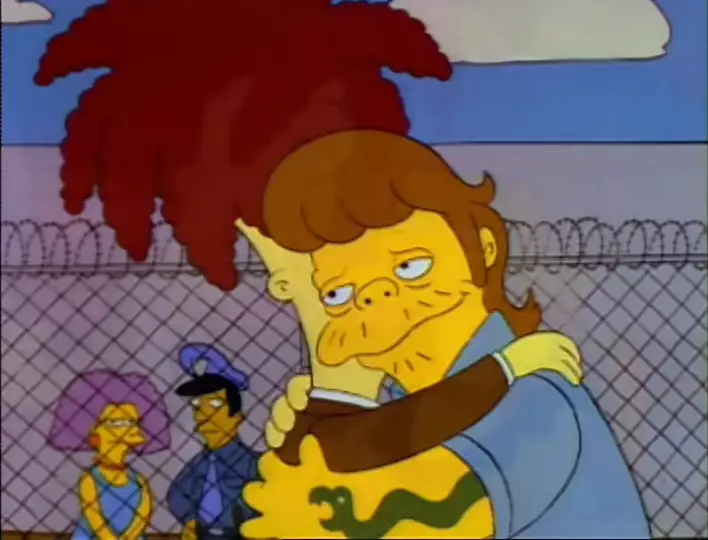
Bart’s mistrust here is nicely countered in the largely excellent Brother from Another Series. It has little legs here, but part of the overall joke of these episodes is that Bart’s negative traits turn out to be good things.
I don’t know that I’ve ever heard someone not in their 60s sound like Patty or Selma, but I suppose that’s what a lifetime of smoking will do to you.
That even Patty likes Bob is a testament to his charm.
Bob patting Bart on the hand and thanking him for foiling the Krusty framing is as close to disingenuous as this scene gets.
“…some divine ashtray” is a goodun.
Allllll they had to do was get the audience to know that Bob knew about Selma’s money and needed it for something SOMEwhere in the last 8 minutes of fuck-arseing around.
So there’s the concrete author (the story’s writer), the abstract author (the concept that exists as a result of the choices made in constructing this episode), the narrator (the frame and flow of the plot), and then Bob within all this as character narrator of his own story. Each of these is a distinct level and one can have a lot of fun in how you make them interact. When you have a lot of interaction points like this, you have a lot more spaces to hide clues, create doubts, or reveal information. None were used by people who should really know better.
This montage is filler in an episode that needed meat.
Blinky sighting again, one of the early show’s great icons.
The frolicking through the flowers scene has some good visuals in Bob’s demented glee. What are we seeing here? Is it real? Is it representative of an emotional state? Tighter control of your levels of communication lets you use moments like these to get these questions to do narrative lifting or thematic support. Fight Club does a lot of this stuff in quite visible ways.
Foot corns are gross. My feet a calloused and bashed up from years of kicking things, but those bits still all look like foot. I don’t know what the hell you have to do to get corns.
This moment with Bob and the feet presents him as genuinely enjoying the task, or at least enjoying helping someone he cares about. Some sinister note here would have been nice. It wouldn’t have fixed anything, but it would have at least given the core idea of the episode more time.
The show makes great hay out of Moleman/Ralph Melish doing eye tests. I love the later ones for things like “coke, chicken, mailman” being his answers.
Framing moments like the family watching the Telethon make it a showing moment whereas simply cutting to it would be a telling moment. It creates reason within the family sitcom structure and allows for other moments, like looking at Sideshow Mel also watching at home and having Bart redeclare his position, to exist in a similarly natural manner.
Wendell in the front row for the Motion Sickness Telethon is a nice touch. There’s also who appears to be the early Ralph here, too. The writers chose motion sickness because they felt they could make fun of it without upsetting too many people.
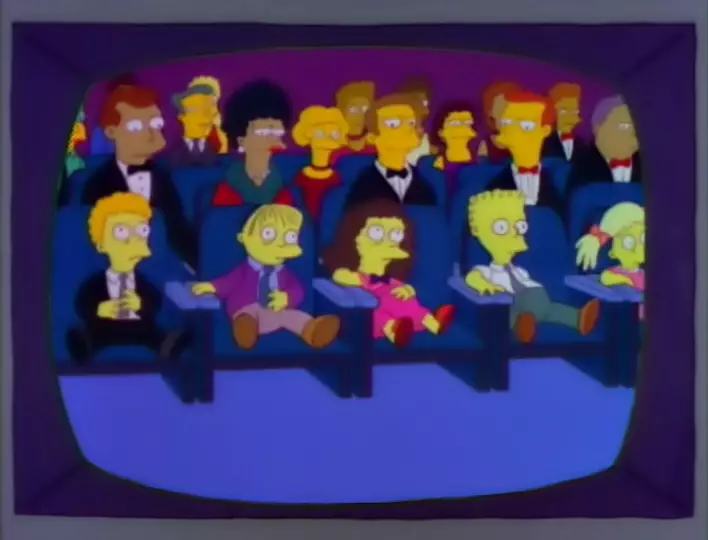
There’s a demented glee in Krusty’s face when he’s booting Bob that I really appreciate, as though it’s the one thing that really makes him happy. That kick has to be a really solid anti-air, too.
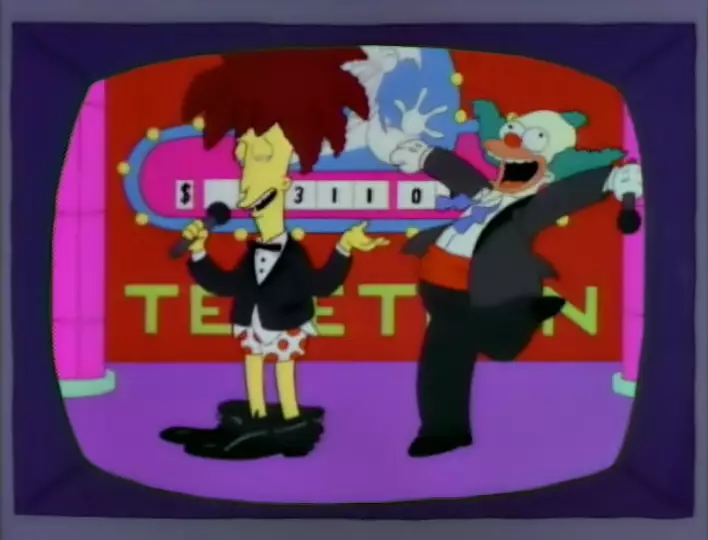
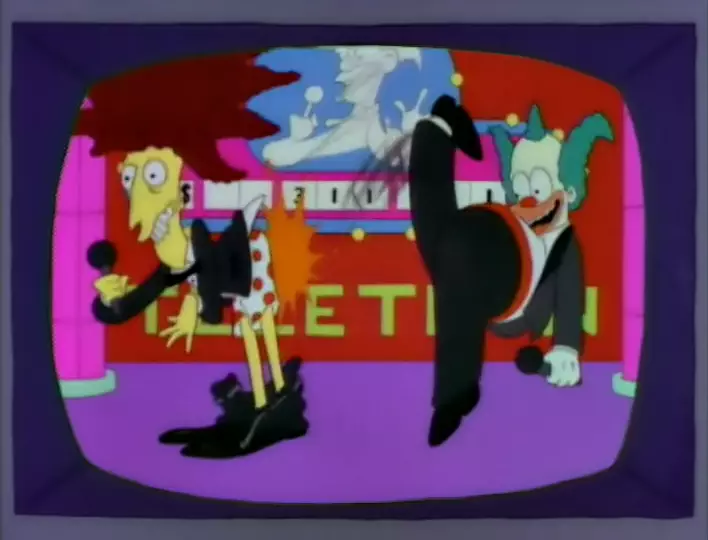
Adhering to bride’s wearing white because of tradition is fine; adhering to it for the reasons the tradition exists is creepy. It’s a very Marge thing, though, and Selma’s grunted response is a goodun.
“Trencherman” is a word for a guy who eats a lot and comes from the Latin for lop “truncare” (like cut), via France, “trenchier” to cut, where it picked up the reference to a board upon which food was cut.
The red sauce Homer refers to with his cocktail weenies is probably tomato sauce, common in Australia and only somewhat distinct from ketchup. Weenies are called cocktail franks here, but “cheerios” were what they were called when I was a kid, and I’ve no real idea why. Possibly as a corruption of chorizo.
Homer’s delight at eating something mysterious is fun.
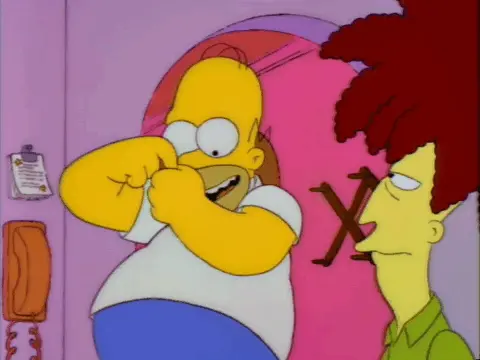
“Selma my dear, I’m confused” while Bart listens in the background. All they had to do was have Bart find some kind of note or something, indicating that Bob already knew, otherwise, this here is Bob finding out that Selma can’t smell. This detail is immediately forgotten by the series, which I think is a bit of a waste.
“I told ya, I got money” So this scene gives us our mystery via the presentation of means and motive. Selma’s line suggests she already told Bob of her financial situation, though it was from nuisance lawsuits earlier, but then why did he ask at all? If Bob already knew, and already had a plan forming, then this is a pointless question for him to ask. This is that matter of information management, the narrative needs Bart to know as he’s the agent and it needs the audience to know because it’s the puzzle we interact with, but having Bob be the vector of it corrupts necessary knowledge lines. Just have Marge bring it up, staggeringly easy solution.
Shots like this of Bart are the direct statements of narrative purpose. Cutting to a shot of an unrelated character is terrible editing, so it can only be done, and is only done, to communicate something to the audience.
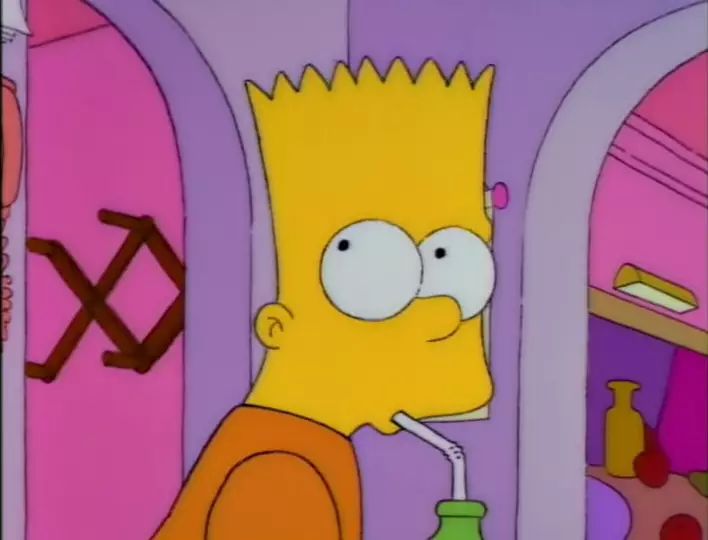
A more sophisticated method would be to have left it at this shot of Bart walking by in the background.
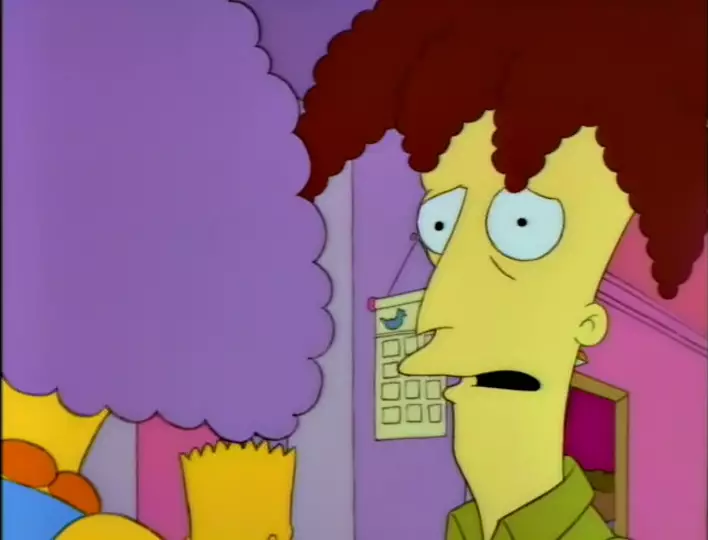
11:15 marks the tone change with Bob. The musical tone and his pause before remarking on Selma’s other qualities indicate he isn’t on the level. This clashes directly with earlier scenes like Bob happily massaging corns and lacks any established reason. Bob’s episode villainy has been based around murderous threat to Bart, so shifting the focus to theft is something that must be done deliberately and with care. Him just being broke isn’t enough, it needs to tie in to character. Something like trying to start his own kid’s TV show would have been good.
“Whatever you say, mum” from Barney as the buggy driver is a solid little cameo. Him having a variety of weird jobs around town is something that I’d like to have seen developed.
The MacGyver element could have been used to fuel the murder, too, as Selma’s treatment of Bob over the show is a red flag.
MacGyver was a weird show, sorta like America’s Doctor Who. I maintain he should have been one of the Meddling Monk’s incarnations. It’s a really good choice for an aunt’s favourite show, every element of it is so TV safe that it works as a naff joke and as a character point for Selma.
Bob’s rant about MacGyver applies to this episode, really.
Selma picking MacGyver over marriage is deep fandom.
The temptation to rip into a partner’s favourite media is something I’ve learned to curtail because every woman in my general dating pool is a diehard Harry Potter fan. I got glared at for calling Dumbledore “Bumblewhore” and almost yelled at for calling Artemis Fowl “Fartemis Bowel”. I grew up a nerd when that meant something, so I hide all my interests away from family, friends, and loved ones.
Here’s a question: what is the point of all this MacGyver arguing if he’s going to kill Selma? He’s about to thwart his own plan that is real and exists.
This is such a retro relationship problem to have. “What do I do while my significant other is using the only screen in the house?”
“Bart no like, bad medicine” I think this comes from an old Tarzan serial, but I can’t find it.
Lisa’s bitterness at not being the flower girl is great. She has nothing to do this episode, so it’s nice to see a focal moment with such character.
There’s a lot of lovely cinematography in this episode. A lot of new locations and busier moments within the house that prompted a bit of thought. This shot in the church is beautifully done.
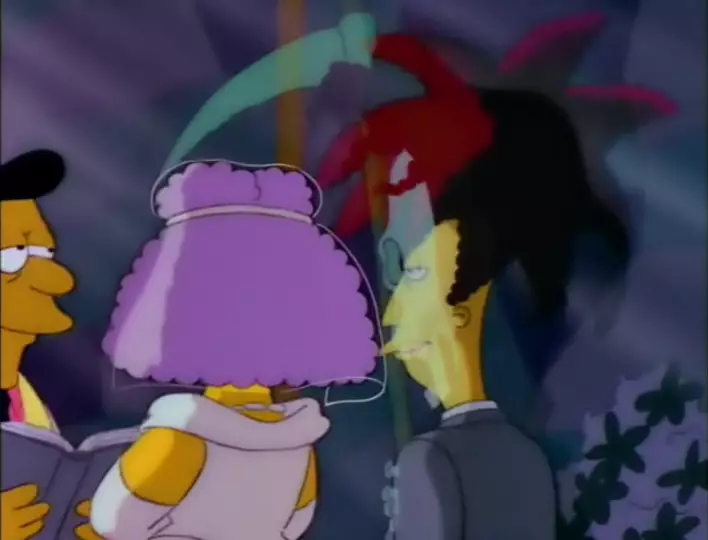
The Death shot with Bob cements the episode into Bart’s perspective, now that Bob is a villain.
Lisa dancing on Grampa’s feet is a classic wedding sight. The band look familiar, too. I think some of the designs pop up elsewhere.
Weddings are another one of those cultural behemoths for most of the planet, so their easy things to breeze through using plucked details for comedy or narrative. Barney chugging the whole bottle is nice, but Homer summoning waiters, leading to the pulling arial shot of him wolfing food down is a good further escalation.
Plays into Patty’s musings about her own singleness. Once again, her being a lesbian was a weak decision as it had precisely zero build.
Wiggum leaving the gun near the cake is visible from a mile off, but the kids grabbing slices near it helps it over the line.
“I’m dying of jealousy”
Apu with Princess Cashmere at the wedding. Bleeding Gums is there, too. Kind of an odd spread, but with a smaller back catalogue of regulars and no established social circle for Patty and Selma, there were fewer options.
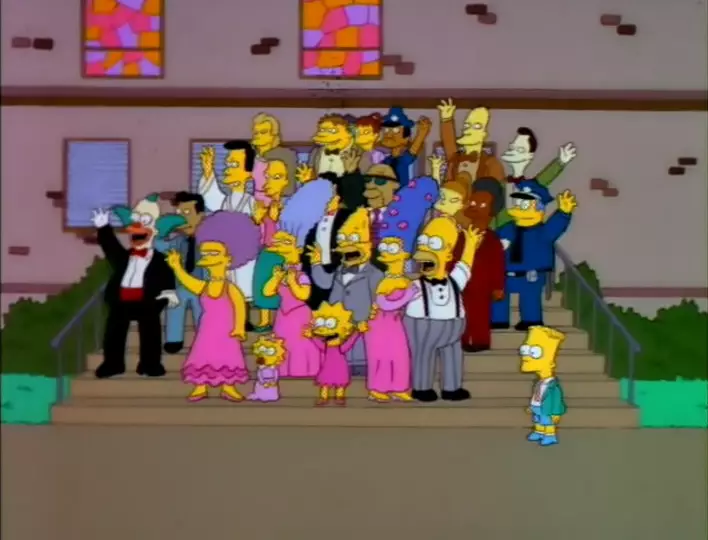
Lovely lighting in the car and the license plate callback is a goodun. Also, last sign of what’s going on for the really slow students.
This whole video honeymoon thing is another example of poor information management. In the modern world, something like this could easily be part of some Facebook stream or something, but here it’s a VHS tape that has to somehow make its way from where Selma and Bob are honeymooning to the Simpson house. Ignoring the mechanics, why? Would Selma be belting out of the room, post coitus, to get this tape to a courier? Bart could have seen Bob screaming into a phone about this at a wedding.
ECONO-VHS
Rolling rock is great.
“and make love?”
This tone that Bob has, his visible disgust at Selma, his evil asides, this needed to either be present from the beginning or not here at all. It doesn’t assist the mystery at all and it just clashes with prior information. Adding it slowly, with early signs being explainable, and letting them develop over the story would have been fine.
What was the point of the earlier scene where Bob is happily rubbing Selma’s feet? If anyone put any thought into the different communication layers, that earlier scene could have been from Selma’s perspective and shown the audience how she missed signs. This scene where Bob says things in different languages could have been the retelling that revealed pertinent information.
More great shots of Bob turning the gas on. Night and odd moods are great drivers of cartoon cinematography.
The MacGyver repeat is one of my earliest favourite things. It’s a beautiful combination of the gruff excited guy voiceover common for the era, the oddness of the name “MacGyver”, the faint distortion of the word as it rattles around Bart’s head, and the semantic saturation of an already strange series of phonemes. One time, I found one of those hour-long YouTube videos of just this and played it at the bar. Can’t find the damn things anymore, must have scrubbed them.
See, this scene, where Bob raises a glass to his plan and we see Selma explode, THIS is clever information management. That something else happened is not something the audience’s character-based perspective could tell us, so the contradiction is a surprising recontextualization and not a clash.
“And then I go and spoil it all by doing something stupid like explode you” is good. I wonder if it was the reason the song was included at the start.
I think this scene’s based on one of the Bond movies.
Psycho reference with the chair spin and lightbulb whack.
What Bob says here is, “My best laid plans have gang agley.” “Gang agley” is Scots for “to go” and “awry” respectively, and Bob is probably referencing a Robert Burns poem and not just slapping some Scots in there for funsies. Scots is a distinct language but budded from Middle English around the 12-1300s, so it can be hard for outsiders to distinguish it or elements of it from thick Scottish English dialects. That said, you are probably familiar with some Scots, through Burns as well as he wrote Auld Lang Syne. Recently, a Scot discovered that the entire Scots wiki entry was written by someone who didn’t actually understand the language, which is the most hilariously Scots thing ever. Welsh is still laughing.
Ah, the payoff, well, this would be the payoff would go if there were really anything to pay off.
Wiggum’s “It’s the only way I’ll learn” is great. He’s got a kind of innocent stupidity, similar to Homer’s in severity but tempered with a naivety that keeps it from hurting him.
Glossing over anyone believing Bart’s story is for the best and the jokes used to do it are very good. The path of Bart’s explanation going from live stove demonstration, to “Science Made Very Very Simple”, to a diagram, and finally, the fucking hand puppets. Bart alternating between puppets like they’re having a conversation suggests a level of effort put into the performance itself, which is beautifully funny. Capping it by having Marge get it at once is good.
“To the Simpson-mobile!”
“Oh, right, the gas” Could probably open a window or turn the gas off or something.
And the contractually obligated Democrat joke the writers have to add so Kelsey Grammar will do the episode.
Speaking of which, here is Kelsey naked at a kitchen table, either drunk or hung over. Either way, I had to see it, so now you do too. He’s nuts, and I recommend looking into his autobiography.




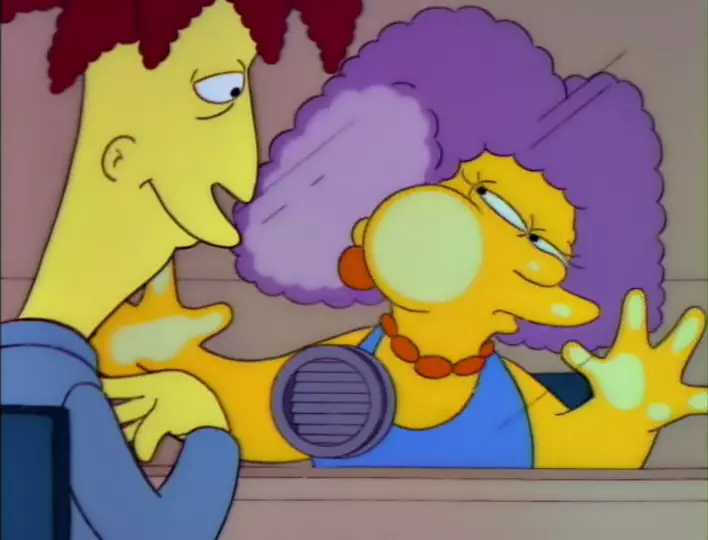

8 replies to Black Widower
SAUglaz on 13th October 202013 Oct 20 said:
Well, now you can rip into Harry Potter from a moral highground.
My best guess is that Bob was putting on a show of forgetting that she has money.
Magnumweight on 14th October 202014 Oct 20 said:
It really is frustrating how just a few simple changes would have made the narrative much better, I'd maybe put it down to the format and expectations of the sitcom in the 90's. Cape Feare dropped the mystery part in favor of a straight up thriller and was all the better for it and I'd say Sideshow Bob Roberts was a better plot even
I do love Sideshow Mel's devastated "All I can be is myself," I'd have liked to see the two interact during the good era of the Simpsons.
Gabriel on 14th October 202014 Oct 20 said:
Part of what's galling about this story is that the mystery could be easily done. Feare's a good episode for its cleanliness but some of that is down to how derivative its plot is. The parallel beats are like paint by numbers. Bob Roberts is a good episode and actually does the thing where a character breaks and confesses properly.
MrWishart on 13th October 202013 Oct 20 said:
How about Bob knew about the nest egg, but not the exact dollar figure of it and was worried about whether the expense of the wedding would ruin it?
Gabriel on 13th October 202013 Oct 20 said:
It still doesn't cover the MacGyver fight, or much else of what was shown, and at any rate, that's the hypothetical problem. You having to fill in gaps with your own made up solutions means they haven't done their job. If a guy sets up a big Rube Goldberg machine in front of you and it fucks up a quarter of the way through, them telling you to just picture the rest of it is garbage.
MrWishart on 14th October 202014 Oct 20 said:
It's just the way Bob phrases his question to Selma: "Can we really afford it?", not "How can we afford it?" The latter would be more appropriate if he was entirely unaware of the money as you state, the former seems more like he's aware there's money (since he doesn't have to ask 'how', he knows there's a 'how') but he doesn't entirely know how much.
Doesn't fix the rest of the episode's issues, of course, but it's one of Rube Goldberg parts that I felt wasn't really broken here.
Gabriel on 14th October 202014 Oct 20 said:
For your interpretation of his question to work, the scene would have to answer it. He doesn't find out how much money there is. Interrogative sentences formed with "can" prompt short answers like the one we got. Selma's extra information, even ignoring the fact that it conflicts with the nuisance lawsuit point, was not prompted by Bob's grammar. A "how" question would have demanded an explanation beyond a yes or no on the possibility.
It's broken because it isn't an operant part without you adding your own guesswork. This stuff can't be vague, it can be cleverly presented but never vague.
MrWishart on 13th October 202013 Oct 20 said:
"The temptation to rip into a partner’s favourite media is something I’ve learned to curtail"
Also this. I got a day of icy silence for daring to point out how boring Grey's Anatomy is
Comment on Black Widower
To reply, please Log in